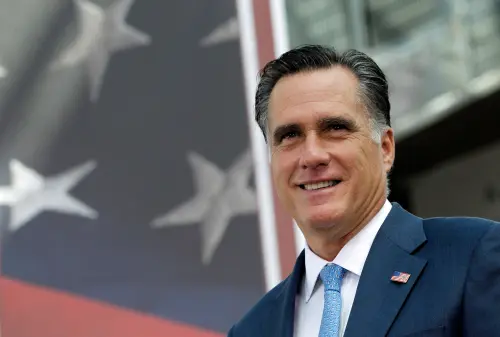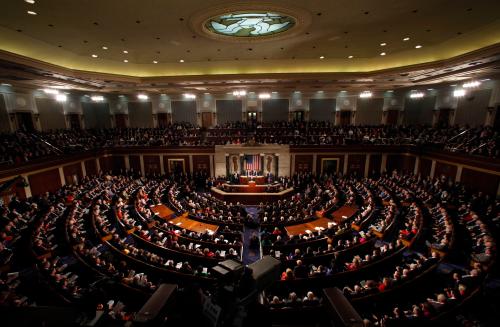After the first night of the Democratic National Convention, Shadi Hamid observes that the DNC and RNC—and the messages coming out of them—are visual representations that two different Americas exist. This column originally appeared on PBS NewsHour as part of a series running during both of the 2016 national political conventions.
The first night of the Democratic National Convention was a rousing success, with first lady Michelle Obama and progressive icon Sen. Elizabeth Warren offering one of the most impressive succession of speeches I can remember seeing. It was inspiring and, moreover, reassuring to see a Muslim – Congressman Keith Ellison – speaking to tens of millions of Americans in prime-time, offering a stark contrast to the casual anti-Muslim bigotry that has become a feature of our national discourse.
Meanwhile, under the stewardship of Donald Trump, the Republican Party appears to be morphing into a European-style ethnonationalist party. In a two-party system, this can’t help but affect the Democrats’ own message, since each party comes to define itself, and even understand itself better, in opposition to the other.
As powerful as that first night of the DNC was, especially as a member of one of the minorities Trump has so often sought to attack, I couldn’t help but wonder. It was a bit dispiriting to see, in such visual form, that there really are two Americas. The message of the Republican National Convention seemed like it was being beamed in from a different country, at least if your point of reference was growing up in Washington or New York City. It was a dystopian vision of a declining America that was no longer itself.
But I could also imagine would-be Trump supporters in “real America” watching the proceedings at the DNC and feeling detached, as if they were watching a country that had moved well beyond them. Here were Democratic politicians, elites and delegates, celebrating diversity in all of its colors and persuasions. I can imagine the emphasis on inclusion seeming, to some, self-satisfied, even condescending, as if we were reminding “angry whites” that they were somehow deficient, and that the responsibility to change their lot was only theirs, and not ours.
In my own work in the Middle East, my starting assumption as a researcher has been to suspend my own ideological preferences and to immerse myself in the world of people I don’t agree with and wouldn’t want to live under (namely Islamist movements). I don’t think we do nearly enough of that in our own country.
In some sense, it’s almost too obvious. The Democratic National Convention, with its joyous inclusion, is not what America looks like in the more rural expanses of Virginia, where, by chance, I happen to be writing this very piece. One of the towns I passed through, Elkton, Virginia (population 2,762), already seemed like something out of a post-apocalyptic serial, with deserted streets, shuttered general stores, and nothing seemingly happening.
Having lived the majority of my adult life abroad, I used to joke with my fellow American expats that I probably knew other countries better than I knew my own. Liberals often complain about rural and working class voters voting against their economic interests.
But for a resident of Elkton, I can understand it in reverse. Why wouldn’t they vote for Donald Trump? Hillary Clinton is not promising a break with the past eight years, but a continuation of it. That is part of her appeal – building on and extending Obama’s legacy, at least on domestic policy. But if your experience of the past eight years has been one of economic, social and moral stagnation, or worse, then why would you want something resembling the status quo? I can imagine an Elkton resident watching the Democratic National Convention and not seeing, or hearing, themselves represented. For them, it might as well have been a different country.
The risk is that as whites become a smaller majority – and eventually an outright minority – the tendencies toward ethnic politics we’ve witnessed in this election season might very well intensify. The specifics of Hillary Clinton’s policies are almost beside the point. Most Democrats and Democratic-leaning voters will cast their vote for Hillary because it is part of their identity. Liberals and Democrats are not really part of a party, as much as they are part of a new America that looks and thinks differently and has little interest in looking back, wherever that might be. More than a party, it is a lifestyle, a culture and a sensibility, with its own media, institutions, norms and values.
It’s striking that, as Americans sort themselves into various identities, how little Christianity has seemed to factor in, compared to more traditional kinds of ethnic and nationalist markers. These are perhaps our “first real intimations of what a genuinely post-Christian politics might look like,” as Ross Douthat recently put it.
From a secular standpoint, this might seem like a good thing in theory, but it’s a bit more complicated in practice. As I discuss in my new book, all states require some unifying set of norms and ideas to bind citizens together (the 14th century historian Ibn Khaldun had a great word for it, asabiyah, which roughly translates as ‘social solidarity’ or ‘group consciousness’). A unifying nationalism is out, since our conceptions of America have apparently become so different. A “moderate Christianity” seems to be out, at least for the time being. Which doesn’t leave us with much.
Usually, when I write articles, I try to find a way to end on a positive note. In this case, it’s difficult. Again, I find myself returning to the kind of cross-party civic communitarianism that I sketched out in my previous column. The communitarian instinct is difficult to plot on a traditional left-right spectrum. Some saw communitarian themes in Sen. Cory Booker’s convention address, including his call for a “nation of interdependence” and for a civic virtue of love over tolerance.
I, however, would more than happily take tolerance right now. We can barely do that much as it is, and perhaps for good reason: quite a lot is at stake. This is perhaps the first election, at least in my lifetime, that sees us, as a country, moving beyond left and right, toward something more inchoate but probably more frightening. But whether these divides deepen or retreat will depend on who wins in November and, perhaps just as important, how the losers of the election take their loss.






Commentary
Will left vs. right become a fight over ethnic politics?
August 1, 2016